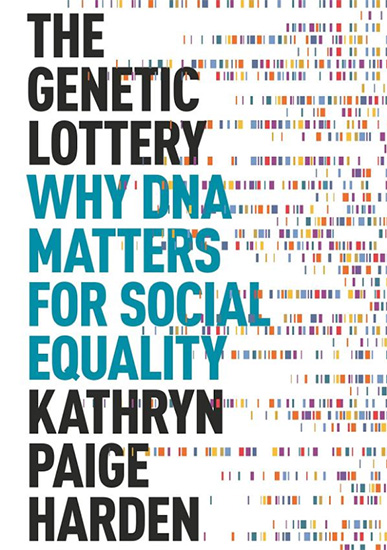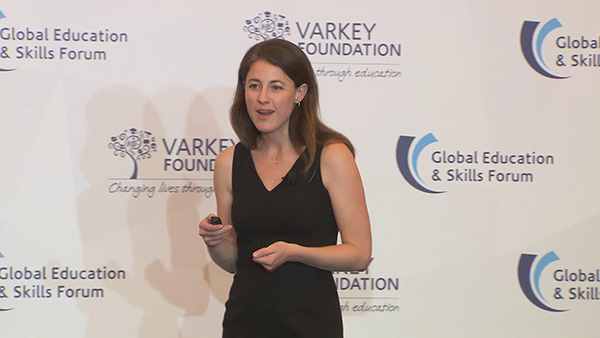How to Reconcile Egalitarianism with Genetic Reality
F. Roger Devlin, American Renaissance, September 17, 2021

Kathryn Paige Harden, The Genetic Lottery: Why DNA Matters for Social Equality, Princeton University Press, 2021, 312 pages, $26.95 hardcover, $16.17 Kindle.
Kathryn Paige Harden, a professor of clinical psychology at the University of Texas, has just published The Genetic Lottery, a much-heralded book that tries to reconcile progressive politics with the reality of genetic differences. Given the continuing dominance of egalitarian thinking and the ever-greater difficulty of dismissing the results of modern science, such books are likely to become a substantial genre. Frederick deBoer’s The Cult of Smart, which I reviewed for American Renaissance last year, was an earlier example.

A recent profile in the New Yorker described Prof. Harden as waging a two-front war: “on her left are those who assume that genes are irrelevant, on her right those who insist that they’re everything.” The first group, sometimes referred to as blank-slatists or social constructivists, are an omnipresent force within the academic world with enough power to make things unpleasant for genetic researchers (though not yet enough to stop research altogether, which many would like to do). The second group, said to insist that “genes are everything,” appears imaginary. A few philosophers may have toyed with the idea that humans merely execute inborn genetic programs, but empirical researchers know that all human behavior is influenced by both genes and environment.
What the New Yorker profile really means by “those who insist genes are everything” are race realists, whom Prof. Harden has clearly not understood. Early on in The Genetic Lottery, she offers a potted history of what she calls the “eugenicist right,” despite the fact that the eugenics movement was, if anything, a leftist, progressive movement. It will all sound familiar to connoisseurs of race-denialist literature:
First, there was Francis Galton, who inspired the eugenics movement, which resulted in passage of Virginia’s Eugenic Sterilization Act, upheld by a court with the remark that “three generations of imbeciles is enough.” Such thinking in turn inspired the atrocities of Adolf Hitler and the Nazis. Today, it continues to be invoked by unscrupulous characters like Jared Taylor (and even Charles Murray), who preach that the white race is superior to all others and should therefore monopolize all the world’s good things, especially power, while oppressing their inferiors.
In contrast, her polemic against the genes-count-for-nothing position draws upon her full professional expertise, so she is waging her “two-front war” in a very asymmetrical way.
Genome-Wide Association Studies
Professor Harden’s work is mainly in the area of Genome-Wide Association Studies, or GWAS (pronounced Gee-Wass). Researchers choose a trait such as height, schizophrenia, or years of formal schooling and feed genetic information from a sample group into a computer. Inevitably, they find that the tallest, most schizoid, or educated people tend to have more of certain genetic variants and fewer of others than the group as a whole. The number of these variants is often very large, each with only a small effect on the trait. A “polygenetic score” can be computed for the trait, and the score has predictive value. For example, if someone has many gene variants associated with schizophrenia, his risk of developing schizophrenia will be higher than average.
A GWAS finds genetic correlations — not necessarily causation — between genetic variants and phenotypic traits. In the case of a trait such as height, there is a good chance that many of the associated variants are causal, but nearly every trait is heritable to some degree, including such things as marital status, religiosity, and political beliefs. (This means that parents and their children — and even more persuasively, identical twins separated at birth and reared apart — tend to be similar in these ways.) For many people, it is difficult to believe that genes influence such matters as getting divorced or becoming a Missouri Synod Lutheran.

Credit Image: © David Bro/ZUMAPRESS.com
Even for physical traits such as height, we almost never understand the causal genetic or metabolic pathways. We may never entirely understand them. Nevertheless, despite caveats about polygenetic scores and causality, Prof. Harden says this about education levels, which are good shorthand for intelligence:
Genes associated with educational attainment are preferentially expressed in the brain, and within the brain, they are preferentially expressed in neurons. Zeroing in on the “top” genes associated with educational attainment, they are involved in the processes that are critical to the ability of neurons to communicate with one another. Those processes include the secretion of neurotransmitters that carry messages from neuron to neuron, the plasticity of neuronal connections in response to new information or in response to disuse, and the maintenance of ion channels that are necessary for a neuron’s electrical charge.
This sounds more like correlations between genes and height than those of genes and being a Missouri Synod Lutheran.
Prof. Harden clearly understands something that is anathema to many of her social-science colleagues: We are not blank slates, and the genes we are born with determine to some degree who we are and how we will live.
Race differences
However, Prof. Harden applies this understanding only to people of the same race, adding the extraordinary claim that “there is zero evidence that genetics explains racial differences in outcomes like education.” She writes:
We cannot and should not expect GWAS results to be “portable” across genetic ancestries. What you discover in one group isn’t expected to apply to another group, and if you study a different group, you might discover different genes. This expectation is clearly borne out by the data. Looking across a diverse set of phenotypes, polygenetic indices based on analyses of European ancestry populations are less strongly related to phenotypes measured in other populations, particularly African ancestry groups.
I will take Prof. Harden’s word for how the data shake out, but it doesn’t support her claim about genes and education outcomes. First, if polygenic scores that predict outcomes for whites don’t predict them for blacks (or predict them less accurately), doesn’t that suggest important racial differences?
Second, GWAS has found race differences in comparable education-related genetic patterns to support the view that race differences in outcome are at least party genetic in origin. Prof. Harden might dismiss such studies as insufficiently “portable” across races. For reasons of funding and to protect reputations, there may never be a powerful GWAS study that definitively demonstrates races differences in intelligence-related genetic patterns. However, that means only that studies using that method have not (yet) found such evidence.
Needless to say, there is an enormous amount of evidence of different kinds for race differences in intelligence, as well as many other outcomes. It has filled books by such people as Arthur Jensen, Michael Levin, Snyderman and Rothman, Philippe Rushton, Richard Lynn, Charles Murray, Edward Dutton, and all the way back to Audrey Shuey and Frank McGurk.
Prof. Harding says nothing about this evidence, other than implying that the people who study the question are bad.
The unbearable whiteness of genetic databases
Like other academics, Prof. Harden bemoans the fact that genetic studies have focused mainly on white people. Twentieth century geneticists in American and Europe who needed DNA samples did not look for them in Timbuktu. They got them from students and colleagues. This was not because they believed their neighbors belonged to the Master Race, but because it was easier. In the early days of genetic research, it often did not matter whether DNA samples came from a man or a dog.
We have now mapped the human genome, and the issues being researched are more fine-tuned. Some medical treatments don’t work for all races, so there is a need for data from different groups. But even if there is new, broad-based research, Prof. Harden warns that “there are valid concerns that DNA will become yet another valuable resource extracted from marginalized populations by White people for the benefit of White people, while leaving participants vulnerable to surveillance, discrimination, and other harms.” If white people study only white people, that’s wrong, but if they study all people — for the purpose of helping them — that will probably be wrong, too.
Genetics and equality
The subtitle of Prof. Harden’s book is Why DNA Matters for Social Equality. This is a large claim: Rather than setting limits on what egalitarian social engineers can accomplish, genetics can help them. Her argument is simple:
When inequality is seen as stemming from lucky factors over which people have no control, both conservatives and liberals are more likely to see those inequalities as unfair and to support redistribution to equalize outcomes. Genetics is a matter of luck in people’s lives. Appreciating the role of genetic luck in people’s educational and financial success undercuts the blame that is heaped on people for not “achieving” enough and might, in fact, bolster the case for redistributing resources to achieve greater equality.
Race realists don’t deny that “genetics is a matter of luck in people’s lives.” Those with fortunate endowments haven’t “earned” them, and if they do high-paid work because of them — practicing medicine or designing airplanes — it’s to everyone’s advantage that work on which other people’s lives may depend be performed by the most competent people. If anyone doesn’t want to recognize chance, it’s promoters of the idea that villainous whites are responsible for everyone else’s problems. Prof. Harden should teach them about the genetic lottery.
But is she even right to think that understanding the chance nature of genetic endowments will persuade conservatives — or even liberals, for that matter — to accept redistribution? As Jared Taylor wrote recently, it might be possible to explain to middle-class whites that people in Section 8 are not responsible for the laziness and poverty they inherited through their genes, but that will not make them more desirable neighbors.
Prof. Harden hints broadly that egalitarians like her who understand genetics will come up with social programs that actually work and will lead to greater equality. I was looking forward to a list of such programs. I was disappointed.
Ignoring genes is morally wrong
Not to be too hard on Prof. Harden, I will conclude with some powerful words from her book about why so many social programs fail:
Ultimately, all interventions and policies are built on a model about how the world works: “If I change x, then y will happen.” A model of the world that pretends all people are genetically the same, or that the only thing that people inherit from their parents is their environment, is a wrong model of how the world works. The more often our models of the world are wrong, the more often we will fail in designing interventions and policies that do what they intend to do . . . .
Open almost any issue of a scientific journal in education or developmental psychology or sociology, and you will find paper after paper announcing correlations between parental characteristics and child development outcomes. Parental income and child brain structure. Maternal depression and child intelligence. Each of these papers represents a massive amount of investigator time and public investment in the research process, and each of these papers has an easily-explained flaw — that differences in children’s environments are entangled with the genetic differences between them, but no serious effort is being expended toward disentangling them.
This is remarkably close to the conclusion of Charles Murray’s latest book, Facing Reality, in which he also asked scientists not ignore the obvious: “I don’t ask for much. I will be gratified if researchers are buffered from accusations of racism because they entered IQ scores as an independent variable in a regression equation.”

Kathryn Paige Harden
Prof. Harden would never credit Dr. Murray with a good idea. Instead, she attributes to him — outrageously — the view that “one’s DNA determines one’s intrinsic worth” and that “to be White is superior.”
And yet, she denounces those who ignore genes in stronger terms than Dr. Murray is ever likely to have used:
It’s stealing. It’s stealing people’s time when researchers work to churn out critically flawed scientific papers, and other researchers chase false leads that will go nowhere. It’s stealing people’s money when taxpayers and private foundations support policies premised on the shakiest of causal foundations.
Bravo for Prof. Harden. Let her words ring out throughout the social sciences and in the halls of government.
But let her also consider another kind of stealing: the theft of the moral legitimacy of the entire white race. Let her at least consider the possibility that, just as the rise or fall of individual whites is influenced to some degree by their genes, so are the achievements of races as a whole.
















